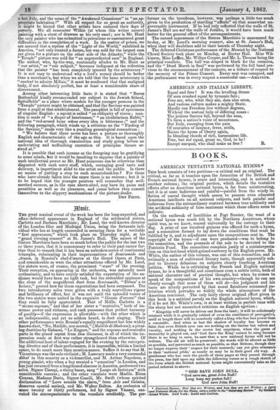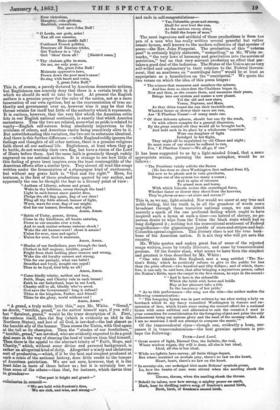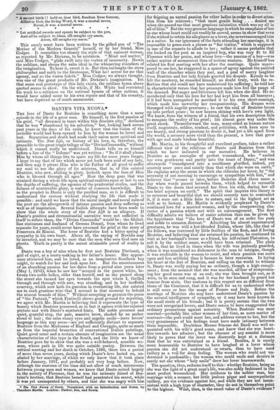BOOKS.
AMERICAN TENTATIVE NATIONAL HYMNS.* Tins book consists of two portions—a critical and an original. The critical, so far as it touches upon the formation of the British and French national hymns, is acute and interesting, and is noticed in another column; the original portion, which details the tentative efforts after an American national hymn, is far from uninteresting, but it is at once ludicrous and painful—painful from the windy in- flation of unreal thought which seems to possess even educated American intellects on all. national subjects, and both painful and ludicrous from the extraordinary contrast between true sublimity and the artificial sublimity of false sentiment which these efforts seem to indicate.
On the outbreak of hostilities at Post Sumter, the want of a national hymn was much felt by the Northern Americans, whose spirit was, as we know, roused universally by the outrage to their flag. A prize of one hundred guineas was offered for such a hymn, and a committee formed to lay down the conditions that must be fulfilled by it, and to adjudicate upon the compositions sent in. The copyright of the hymn—if one were produced—was to belong to the committee, and the proceeds of the sale to be devoted to the Patriotic Fund. The committee complain justly of a misinterpreta- tion on this last head which gained currency in the English press. Mr. White, the author of this volume, was one of this committee, and is evidently a man of cultivated literary taste, though apparently sub- ject to literary delusions on subjects closely touching American politics. While he is criticizing the French and English national hymns, he is a thoughtful and sometimes even a subtle critic, both of national character and of poetical thought, but when he comes to speak of the compositions of his own country—though he can see clearly enough that none of them will do—his judgment and his taste are utterly perverted by that moral flatulence misnamed pa- triotism which pervades so widely the whole atmosphere of the American continent. The only fairly clever original effort given in this book is a satirical parody on the English national hymn, which, if it be not Mr. White's own, is at least written in perfect tune with the sharp but not unmerited criticism on English egotism:
" Kingship will never be driven out from the land ; it will be solicitously retained while it is gradually robbed of even the semblance of prerogative, until at length there will be somebody called a king who has less power than a constable. And when at last the shadow of royalty has become so faint that even British eyes can see nothing on the throne but velvet and vacuity, and nothing in the crown but emptiness, when the game of monarchy is played out, and God Save the King' cannot be sung because there is no king to save, be sure that a new national hymn will not be written. The old air will be preserved; the words will be altered as little as possible, and perverted as much as possible, so that Britons, though they no longer express their respect for their monarch,' can yet give utterance to their national pride,' as nearly as may be in their good old way. A gentleman who has seen the proofs of these pages as they passed through the press, has laid upon my table the following verses as a rough sketch of the form which the British national hymn might conveniently take at the period referred to above: " GOD SAVE JOHN BULL.
" God save me, great John Bull !
Long keep my pocket full!
God save John Bull!
some twenty or thirty performers, led by Signor Vianesi, sae- asui. vasti:mat rtinsi:otv rithey azit}hVartLetteen,,, sad thie7ilatht:Yrdaar; ZtttiZ"V; Richard cuted the accompaniments to the vocalists creditably. The per- Giant White. New York: Rudd and Carlton.
Ever victorious, Haughty, vain-glorious, Snobbish, censorious, God save John Bull !
"O Lords, our gods, arise ! Tax all our enemies, Make tariffs fall ! Confound French politics, Frustrate all Russian tricks, Get Yankees in a fix,' God bless' them all ! [Sirsistrd Inane.] " Thy choicest gifts in store,
On me, me only pour,—
Me, great John Bull !
Maintain oppressive laws, Frown down the poor man's cause !
So sing with heart and voice, I, great John Bull."
This is, of course, a parody dictated by American democratic notions, but Englishmen can scarcely deny that there is a certain truth in it which we should do well to take to heart. At present the English anthem is a genuine prayer for the ruler of the nation, not as a mere incarnation of our own egotism, but as the representation of true au- thority and government over us, however true it may be that the throne retains for itself but little of the authority which it represents. It is curious, however, that the very blot which the American critic hits in our English national sentiment, is exactly that which America caricatures.e the two are related, somewhat as pride is related to vanity—English self-esteem being absolutely impervious to the criticism of others, and American vanity being sensitively alive to it. But notwithstanding this variation, the two are in substance identical. And there is this further difference :—while England coldly. ignores the feelings and thoughts of all other nations, there is a genuine religious faith about all our national life. Englishmen, at least when they go to battle, do not worship their own flag, but have a vision of the Lord of Hosts before them. And the same faith is genuinely though rudely engraved on our national anthem. It is strange to see how little of this feeling of grave trust inspires even the least contemptible of the American efforts after a similar lyric. They almost all read like songs written under the fermentation of a champagne kind of excitement, but without any grave faith in "God and the right." Here, for instance, is the first of these productions quoted by our author, and apparently the one he thought the best in a literary point of view:
"Anthem of Liberty, solemn and grand, Wake in thy loftiness, sweep through the land ! Light in each breast anew patriot fires, Pledge the old flag again, flag of our sires ! Fling all thy folds abroad, banner of light, Wave, wave for ever, flag of our might. God for our banner, freedom, and right.
Amen, Amen.
"Spirit of Unity, potent, divine, Come in thy kindliness, all hearts entwine, Prove to our enemies ever a rock, And to each traitor-scheme ruinous shook ! Wake the old banner-word! shout it amain Union for ever, once and again !
Union for ever, God it maintain.
Amen, Amen.
"Shades of our forefathers, pass through the land, Clothed in full majesty, terrible, grand !
Fright from their lurking place treason and wrong,
Wake the old loyalty earnest and strong.
This for our panoply, what can befal ?
Steadfast and loyal, nought can appal!
Thus to be loyal, God help us all! Amen, Amen.
"Come kindly trinity, noblest and best,
Faith, Hope, and Charity rule in each breast!
Faith in our fatherland, hope in our Lord, Charity still to all, blindly who've erred.
God save the Government! long it defend!
Thine is the kingdom, Father, and friend!
Thine be the glory, world without end
Amen, Amen."
"A grand, a truly noble lyric this," says Mr. White. "Grand," no doubt, " terrible,grand," as the author himself says, if you. will ; but "flatulent, grand," would be the truer description of it. First, the anthem itself, then the flag (which is evidently an idol in the Northern States), and last of all God, is invoked—the last almost as the humble ally of the banner. Then comes the Union, with God again at the tail as its champion. Then the "shades of our forefathers," "terrible, grand," are invoked, wild are evidently expected to do a good deal more in the way of clearing the land of traitors than God himself. Then there is the appeal to the abstract trinity of " Faith, Hope, and Charity," which, without some divine and personal background, is rather an allegorical kind of deity. Altogether a windy and idolatrous sort of production,—which, if it be the best and simplest produced at such a crisis of the national history, does little credit to the temper of American patriotism. We are not sure, however, that it is the least false in taste of those before us ; but it is certainly less so than some of the others—than that, for instance, which dawns thus in grandeur— "Our past is bright and grand—"
culminates in conceit-
" We are bold with freedom's fires,
We are rich, and wise, and strong—"
and ends in self-congratulations-
" Yes, Columbia great and strong,
Shall for ever lead the van, As the nations sweep along
To fulfil the hopes of man."
The most ingenious and artificial of these productions is from tie pen of a man who has really written several graceful but rather ornate hymns, well known to the modern.collectors of that species of poem—the Rev. John Pierpoint. The production of this " veteran poet" is certainly highly elaborate, " compelling," as Mr. White re- marks, " the very laws of harmony and gravitation into the service of patriotism," but on that very account producing an effect that par- takes a good deal of the ludicrous. The States of the Union are so very self-willed and unplanetarf in their relation to the Federal Govern- ment, that an anathema on "centrifugal force" would be at least as appropriate as a benediction on the "centripetal." We quote the two verses on which the idea of this poem hinges :
" The science that measures and numbers the spheres, And has done so since first the Chaldean began it, Now and then, as she counts them, and measures their years, Brings into our system and names a new planet.
Yet the old and new stars, Venus, Neptune, and Mars, As they drive round the sun their invisible cars, Whether faster or slower their races are run, Are ' E Pluribus Unnm'—of many made one.
" Of those federate spheres, should but one fly the track, Or with others conspire for a general dispersion, By the great central orb they would all be brought back, ▪ And held each in its place by a wholesome coercion.'
Were one daughter of light Indulged in her flight, They might all be engnlphed by old Chaos and night; So must none of our sisters be suffered to run, For, ' E Pluribus Unum'—We all go, if one."
It has been suggested to us by a light-minded friend, that a more appropriate stanza, pursuing the same metaphor, would be as follows :
" The President vainly solicits the States (He has done so since Washington first suffered from it), But now as he pleads and in vain gravitates, Drops out of the system too many a comet ; And in spite of recourse To armed men and horse, With which Lincoln resists this centrifugal force, Whether faster or slower they shoot from the heavens, They're plums en uno—at sixes and sevens I"
This is, as we say, light-minded. Nor would we sneer at any true and noble feeling, but the truth is, in all the grandeur of words sown broadcast through these tentative national songs, we can detect scarcely a spark of the one profound feeling which ought to have inspired such a hymn at such a time—no hatred of slavery, no ge- nerous desire to wipe from the Union the black stain which had so long disfigured it; nothing but the conventional sentiment of Federal magnificence—the gigantesque jumble of stars-and-stripes-and-hail- Columbia-spread-eagleism. This literary class is not the true back- bone of the American nation. It is not they who will yet save the country. Mr. White quotes and makes great fun of some of the rejected songs written, some by totally illiterate, and some by transcendental persons. Of the former class, what seems to have been the simplest and greatest is thus .described by Mr. 'White
" One who inhabits New England, sent a song entitled The Na- tion's Bride,' which he positively refuses to give to the public for less than the prize offered—two hundred and fifty dollars ; and of which, there- fore, it can only be said here, that after bringing a mysterious person, called the Nation's Bride, upon the carpet in the first stanza, he says in the second: " And lo here is the sidesaddle Which the bride with horse and bridle May at her pleasure take a ride In the buoyancy of her pride.'
" As to this performance—the song not the ride—the author makes the following communication:
" The foregoing hymn was in part written by me after seeing a lady on horsback which in my fancy resembled Washington in feature and ex- spression of face, which hymn since seeing the reward offord for a national hymn with some addition and allteration to suit the occasion I send to your committee for considderation for the foregoing object and prize the only inducement being our nations glory and the need of the monney offerd. As I am no musician I shell not attempt to compose the music.'"
Of the transcendental class—though one, evidently a hoax, sur- passes it in transcendentalism—the best genuine specimen is per- haps the following:
Taxa—Lord Loyd.
" Great source of light, Eternal One, the Infinite, the real, Where wisdom reigns, thy will is done, all else is but ideal, Ideal, all else is but ideal.
" While we infinite laws survey, all finite things depart, But where mankind on mortals prey, there's no law on the heart, Heart, heart, there's no law on the heart.
" In seventy-six, our unfledged bird made Britons' symbols groan, La, how the hearts of men were stirred when the nestling shook the throne, Throne, throne, when the nestling shook the throne.
" Behold its talons, now how strong, a mighty power on earth, Hark, hear its thrilling native song, of freedom's second birth, Birth, birth, of freedom's second birth. " A second birth ! ! hold on dear bird, freedom lives forever, Allied to God, the living Word, it was a mortal never, Never, it was a mortal never. •
" Let artificial swords and spears be subject to the pen, And all be subject to ideas, till seraphs cry amen, Amen, till seraphs cry amen."
This surely must have been written by the gifted pen of "The Mother of the Modern Gracchi" herself; or by her friend, Miss Codger. It resembles too closely the style of that eminent woman, as reported by Mr. Dickens, to be mistaken. "blind and matter," said Miss Codger, "glide swift into the vortex of immensity. Howls the sublime, and sleeps the calm ideal in the whispering chambers of the imagination. To hear it, sweet it is. But then outlaughs the stern philosopher and saith to the Grotesque, What ho ! arrest for me that agency, and so the vision fadeth." Miss Codger, we always thought, was one of the great products of Mr. Dickens's imagination. -Yet that some real prototype of this lady exists, the sublime hymn above quoted seems to show. On the whole, if Mr. White had restricted his work to a criticism on the national hymns of other nations, it would have added more to his own repute and that of his country, but have deprived us of much amusement.




































 Previous page
Previous page